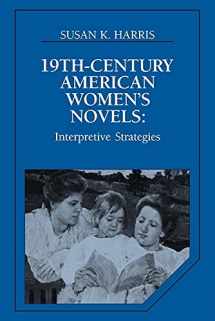
Nineteenth-Century American Women's Novels: Interpretative Strategies (Cambridge Studies in American Literature and Culture, Series Number 42)
ISBN-13:
9780521428705
ISBN-10:
052142870X
Edition:
Revised
Author:
Susan K. Harris
Publication date:
1992
Publisher:
Cambridge University Press
Format:
Paperback
256 pages
FREE US shipping
Book details
ISBN-13:
9780521428705
ISBN-10:
052142870X
Edition:
Revised
Author:
Susan K. Harris
Publication date:
1992
Publisher:
Cambridge University Press
Format:
Paperback
256 pages
Summary
Nineteenth-Century American Women's Novels: Interpretative Strategies (Cambridge Studies in American Literature and Culture, Series Number 42) (ISBN-13: 9780521428705 and ISBN-10: 052142870X), written by authors
Susan K. Harris, was published by Cambridge University Press in 1992.
With an overall rating of 3.7 stars, it's a notable title among other
books. You can easily purchase or rent Nineteenth-Century American Women's Novels: Interpretative Strategies (Cambridge Studies in American Literature and Culture, Series Number 42) (Paperback) from BooksRun,
along with many other new and used
books
and textbooks.
And, if you're looking to sell your copy, our current buyback offer is $0.3.
Description
This study proposes interpretive strategies for nineteenth-century American women's novels. Harris contends that women in the nineteenth century read subversively, 'processing texts according to gender based imperatives'. Beginning with Susannah Rowson's best-selling seduction novel Charlotte Temple (1791), and ending with Willa Cather's O Pioneers! (1913), Harris scans white, middle-class women's writing throughout the nineteenth century. In the process she both explores reading behaviour and formulates a literary history for mainstream nineteenth-century American women's fiction. Through most of the twentieth century, women's novels of the earlier period have been denigrated as conventional, sentimental, and overwritten. Harris shows that these conditions are actually narrative strategies, rooted in cultural imperatives and, paradoxically, integral to the later development of women's texts that call for women's independence. Working with actual women's diaries and letters, Harris first shows what contemporary women sought from the books they read. She then applies these reading strategies to the most popular novels of the period, proving that even the most apparently retrograde demonstrate their heroines' abilities to create and control areas culturally defined as male.


We would LOVE it if you could help us and other readers by reviewing the book
Book review

Congratulations! We have received your book review.
{user}
{createdAt}
by {truncated_author}


